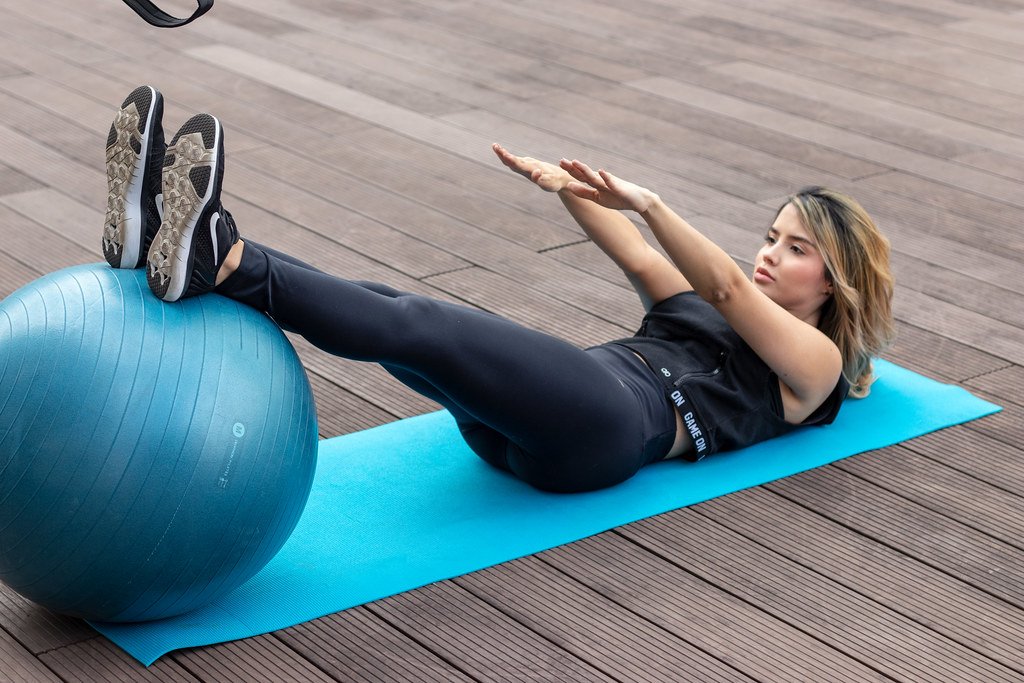After birthing a beautiful new life into the world, new moms are faced with the challenge of navigating the delicate balance between self-care and caring for their precious little one. Amidst the wonder of their new role, many mothers experience a unique phenomenon called postpartum dizziness, which can cause a whirlwind of uncertainty when it comes to exercise routines. In this article, we will dive into the world of postpartum dizziness and explore helpful tips and techniques to ensure new moms can exercise safely while embracing the joy of motherhood. So, lace up those sneakers, moms, and let’s embark on a journey to regain your strength while maintaining a steady and confident stride!
Table of Contents
- Staying Active: Safely Navigating Postpartum Dizziness
- Recognizing the Causes: Understanding the Triggers for Postpartum Dizziness
- Exercise with Caution: Tips for Safely Incorporating Physical Activity
- Workout Modifications: Tailoring Your Exercise Routine to Manage Dizziness
- Seeking Professional Guidance: When to Consult with a Healthcare Provider
- Q&A
- In Retrospect

Staying Active: Safely Navigating Postpartum Dizziness
One of the common challenges new mothers face postpartum is dizziness, which can range from mild lightheadedness to more severe vertigo. While it can be alarming, it is important to remember that most cases of postpartum dizziness are temporary and can be managed with simple precautions and lifestyle adjustments.
To safely navigate postpartum dizziness, here are some tips:
- Stay hydrated: Dehydration can exacerbate dizziness, so make sure to drink plenty of water throughout the day.
- Avoid sudden movements: Take your time when transitioning from lying down to sitting or standing to prevent dizziness spells.
- Get enough rest: Fatigue can contribute to dizziness, so prioritize adequate sleep and rest whenever possible.
- Consider gentle exercises: Engaging in low-impact exercises like swimming or walking can improve blood circulation and reduce dizziness.
- Eat balanced meals: Maintain a healthy diet by including nutrient-rich foods. Avoid skipping meals as it can worsen dizziness.
Remember, if your dizziness persists or intensifies, it is important to consult with your healthcare provider to rule out any underlying issues. With proper self-care and precautions, you can safely navigate postpartum dizziness and continue to enjoy an active and fulfilling life as a new mom.

Recognizing the Causes: Understanding the Triggers for Postpartum Dizziness
During the postpartum period, many new mothers experience a range of physical and emotional changes as their bodies recover from childbirth. One common symptom that often catches women off guard is postpartum dizziness. Understanding the causes of this condition can help new moms better navigate this challenging time.
1. Hormonal fluctuations: After giving birth, the body undergoes significant hormonal changes as it attempts to return to its pre-pregnancy state. These hormonal fluctuations can result in feelings of dizziness and lightheadedness. Estrogen and progesterone levels drop, affecting blood pressure regulation and causing potential imbalances in the inner ear fluid.
2. Blood volume and pressure changes: During pregnancy, the body increases blood volume to nourish the growing baby. However, after delivery, blood volume rapidly decreases, and this sudden change can sometimes lead to a drop in blood pressure. Lower blood pressure can cause dizziness, especially when rising from a sitting or lying position too quickly.
3. Dehydration: Taking care of a newborn can be exhausting, often leaving new moms forgetful about their own self-care. Dehydration can be a common consequence, and it can contribute to dizziness. Make sure to drink plenty of fluids throughout the day, especially when breastfeeding or engaging in physical activity.

Exercise with Caution: Tips for Safely Incorporating Physical Activity
When it comes to incorporating physical activity into your routine, it’s important to exercise with caution. Taking the right precautions can help you avoid injuries and make your fitness journey a safe and enjoyable one.
Safety First: Key Tips to Keep in Mind
- Start Slow: If you’re new to exercise or coming back after a long break, begin with low-intensity activities to allow your body to adapt gradually.
- Warm Up: Always warm up before starting your workout. This helps increase blood flow, loosens up your muscles, and reduces the risk of strains or pulls.
- Proper Form: Whether you’re lifting weights, practicing yoga, or doing cardio exercises, pay attention to your form. This ensures that you engage the correct muscles and minimizes the risk of improper movements leading to injury.
- Listen to Your Body: It’s essential to be in tune with your body. If you feel any pain, dizziness, or shortness of breath, stop exercising and seek medical advice if necessary.
Preventing Injuries: Additional Advice
- Stay Hydrated: Drink water before, during, and after your workout to avoid dehydration.
- Wear Proper Gear: Whether it’s appropriate shoes for running or protective equipment for contact sports, ensure you have the right gear for your chosen activity.
- Vary Your Routine: Incorporating a mix of different exercises helps prevent overuse injuries and keeps your workouts interesting.
- Rest and Recover: Don’t forget to give your body the rest it needs. Adequate rest and recovery time are crucial for muscle repair and growth.
By following these tips, you can enjoy the benefits of physical activity while minimizing the risk of accidents or injuries. Remember, safety should always be your top priority, so exercise with caution and have fun on your fitness journey!

Workout Modifications: Tailoring Your Exercise Routine to Manage Dizziness
Dizziness can be a challenging symptom to manage, especially when it interferes with your workout routine. However, there are several modifications you can make to your exercise plan that can help you stay active and reduce the risk of dizziness:
- Choose low-impact exercises: Opt for activities that have a minimal impact on your balance and coordination. This can include walking, swimming, or using an elliptical machine. These exercises keep your heart rate up without putting excessive strain on your body.
- Take frequent breaks: Listen to your body and don’t push yourself too hard. Incorporate short breaks throughout your workout to rest and rehydrate. This will help prevent the buildup of fatigue and reduce the chances of feeling dizzy during or after your routine.
- Focus on stability exercises: Strengthening your core and improving your balance can significantly reduce dizziness. Incorporate exercises such as yoga, Pilates, or tai chi into your routine. These activities help improve your posture and stability, reducing the likelihood of experiencing dizziness.
- Avoid sudden movements: Slow and controlled movements are key in managing dizziness. Avoid abrupt changes in position, such as standing up quickly or bending over rapidly. When transitioning between exercises, take your time and ensure smooth movements to minimize dizziness.
Remember, it’s important to consult with your healthcare provider before making any significant changes to your exercise routine. They can offer personalized advice and recommendations based on your specific needs and medical history. By tailoring your workout to manage dizziness, you can continue to prioritize your health and well-being.
Seeking Professional Guidance: When to Consult with a Healthcare Provider
Knowing when to seek professional guidance from a healthcare provider is crucial for maintaining your well-being and effectively managing your health. While self-care practices are important, there are certain situations that require the expertise of a healthcare professional. Here are a few indications that should prompt you to schedule an appointment:
- Unexplained or worsening symptoms: If you experience persistent or worsening symptoms that you are unable to explain or manage on your own, it’s essential to consult with a healthcare provider. They can perform thorough assessments, order relevant tests, and provide a diagnosis or appropriate treatment plan.
- Changes in your body: When you notice significant changes in your body, it’s best to seek professional advice. Whether it’s unexpected weight loss or gain, new or abnormal lumps, unexplained pain, or unusual discharge, a healthcare provider can help determine if further investigation is required.
- Mental health concerns: If you’re struggling with persistent feelings of sadness, anxiety, or any other mental health symptoms that affect your daily life, consulting with a healthcare provider is vital. They can provide appropriate interventions, therapy, or refer you to a mental health specialist.
Remember, your healthcare provider is there to support and guide you on your journey to optimal well-being. Don’t hesitate to consult with them, as they have the knowledge and expertise to address your concerns effectively.
Q&A
How common is postpartum dizziness and why does it occur?
Postpartum dizziness is relatively common due to hormone fluctuations, changes in blood pressure, and the strain on the body during pregnancy and childbirth.
Is it safe to exercise with postpartum dizziness?
It is generally safe to exercise with postpartum dizziness, but it is important to listen to your body and modify your workouts accordingly. Start with low-impact exercises and progress gradually.
What types of exercises are recommended for postpartum dizziness?
Gentle exercises such as walking, swimming, or prenatal yoga can help improve balance and alleviate dizziness. Always consult with your healthcare provider before starting any exercise program.
Are there any exercises to avoid during postpartum dizziness?
High-intensity exercises, activities that involve sudden movements or changes in position, and exercises that exacerbate dizziness should be avoided until you feel more stable. It’s crucial to prioritize safety and comfort.
What can I do to prevent or reduce postpartum dizziness during exercise?
Stay hydrated, exercise in well-ventilated areas, avoid overheating, wear proper footwear, and take regular breaks if needed. If dizziness persists or worsens, it’s best to consult a healthcare professional.
How can I know if I am pushing myself too hard during exercise?
Listen to your body and pay attention to warning signs such as increased dizziness, blurred vision, chest pain, or shortness of breath. Slow down or stop exercising if any of these symptoms occur.
Are there any additional precautions I should take while exercising with postpartum dizziness?
Always warm up and cool down properly before and after exercising, incorporate gentle stretching into your routine, and avoid exercising alone in case you need assistance or support.
When should I seek medical advice for postpartum dizziness?
If dizziness is persistent, severe, or accompanied by other concerning symptoms, such as fainting or significant loss of balance, it is important to seek medical advice promptly to rule out any underlying issues.
Can postpartum dizziness be completely prevented?
Postpartum dizziness cannot always be completely prevented, but by taking necessary precautions, listening to your body, and gradually building up strength and fitness, you can minimize its impact and reduce the chances of experiencing severe dizziness.
In Retrospect
In a world filled with endless responsibilities and countless joys, motherhood is a journey unlike any other. However, amidst the beauty of bringing life into this world, the aftermath of pregnancy often presents unexpected challenges. Postpartum dizziness is one such hurdle that many mothers face, causing them to tiptoe cautiously through their newfound exercise routine.
But fear not, dear mothers, for this article has served as your guiding light through the maze of conscious workouts. We have equipped you with an understanding of the delicate balance between safety and self-care, providing valuable insights to help you navigate the path towards reclaiming your strength.
As the sun sets on this journey, remember that your well-being is of utmost importance. Prioritizing your health by listening to your body’s cues is the cornerstone of exercising safely with postpartum dizziness. Embrace the gift of patience and be gentle with yourself as you gradually build up your stamina and regain the vitality that is essential in raising your little bundle of joy.
So, dear reader, as you lace up your sneakers, take a deep breath and embark on this voyage of self-discovery. Whether it be gentle stretches, low-impact cardio, or mindful yoga sessions, remember to cherish each moment of your exercise routine. Seek solace in the strength that lies within your body and soul, for it is this inner resilience that will accompany you as you navigate motherhood’s seas.
May your steps be steady, your spirit unwavering, and your perspective limitless. As you bid farewell to postpartum dizziness, embrace the boundless joy and boundless love that motherhood brings.
As an affiliate, my content may feature links to products I personally use and recommend. By taking action, like subscribing or making a purchase, you’ll be supporting my work and fueling my taco cravings at the same time. Win-win, right?
Want to read more? Check out our Affiliate Disclosure page.